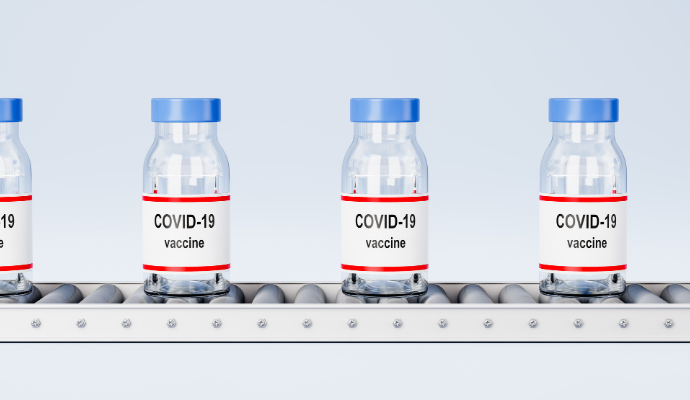CureVac’s Second COVID-19 Vaccine Elicits Improved Immune Response
In other COVID news, Pfizer and BioNTech submit Phase 1 COVID-19 vaccine data to FDA and Moderna revises supply agreement with Canada to provide 105M doses of its candidate.

Source: Getty Images
- GSK and CureVac recently announced that CureVac’s second-generation COVID-19 vaccine candidate elicited improved immune responses and protection in a recent study.
In the study, researchers assessed 12 micrograms of CureVac’s first or second-generation COVID-19 vaccines, CVnCoV and CV2CoV, in cynomolgus macaques.
CV2CoV demonstrated better activation of innate and adaptive immune responses, resulting in faster response onset, higher titers of antibodies, and stronger memory B and T cell activation than CVnCoV.
Specifically, researchers observed higher antibody neutralizing with CV2CoV across all SARS-CoV-2 candidates, including the Beta, Delta, and Lambda variants.
“In this animal model, CV2CoV is shown to induce broad antibody and cellular immune responses very similar to the breadth of the immune responses observed after infection with SARS-CoV-2,” Igor Splawski, MD, chief scientific officer of CureVac, said in the announcement.
READ MORE: FDA OKs 3rd COVID-19 Vaccine Dose for the Immunocompromised
“The current study shows that the immune responses and resulting protection produced by our second-generation candidate, based on our mRNA technology featuring targeted optimizations, are substantially improved in non-human primates against both, the original SARS-CoV-2 virus as well as the Beta and Delta and Lambda Variants of Interest,” Splawski continued.
GSK and CureVac first announced their $180.5 million collaboration in February 2021.
The companies will continue to contribute resources and expertise to research, develop, and manufacture various novel mRNA vaccine candidates, including multi-valent and monovalent approaches.
The goal is to offer broader protection against different SARS-CoV-2 variants and allow for quick responses to new variants that may emerge in the future. Additionally, the companies aim to address multiple emerging variants with one vaccine.
Pfizer, BioNTech Submit Phase 1 COVID-19 Vaccine Data to FDA
Pfizer and BioNTech recently announced that they submitted Phase 1 data to FDA to support a third, or booster dose, of their COVID-19 vaccine for future licensure.
READ MORE: Novavax’s COVID-19 Vaccine Booster Neutralizing Antibody Levels
The Phase 1 trial of the two-dose series enrolled participants to receive a 30 microgram booster dose of the vaccine, BNT162b2, eight to nine months after receiving the second dose.
Researchers found that a third dose of BNT162b2 elicited significantly higher neutralizing antibodies against the initial SARS-CoV-2 virus compared to levels after the two-dose primary series.
Additionally, the vaccine neutralized higher antibody titers against the Delta and Beta variants of concern as well.
“With the continuing threat of the Delta variant and possible emergence of other variants in the future, we must remain vigilant against this highly contagious virus,” Albert Bourla, chairman and chief executive officer at Pfizer, said in the announcement.
“The data we’ve seen to date suggest a third dose of our vaccine elicits antibody levels that significantly exceed those seen after the two-dose primary schedule,” Bourla continued.
READ MORE: AstraZeneca’s COVID-19 Vaccine 82% Effective Against Variants
Pfizer will submit Phase 3 study results, anticipated in the near future, to FDA, the EMA, and other regulatory authorities worldwide.v
FDA has not yet approved a third dose of any COVID-19 vaccine for broad use in the US. But the agency amended the emergency use authorizations for both the Pfizer-BioNTech and Moderna vaccines to allow for an additional dose in immunocompromised adults earlier this week.
FDA determined that the vulnerable group may benefit from a third dose of the respective COVID-19 vaccines as the US enters into another wave of the pandemic.
Moderna Gives Canada 105M Doses of COVID-19 Vaccine, Booster Candidate
Moderna recently announced a revised supply agreement with Canada to provide up to 105 million doses of its COVID-19 vaccine and booster vaccine candidate for delivery through 2024.
The agreement provides 20 million doses each year in 2022 and 2023, with an option for up to 15 million doses each year. The agreement also provides an option for up to 35 million doses in 2024.
“We thank the Government of Canada for their support in this supply agreement for our mRNA COVID-19 vaccine and booster candidate, if approved,” Stéphane Bancel, chief executive officer of Moderna, said in the announcement.
“This agreement reflects the efforts of the Canadian government to address the ongoing pandemic and builds on our existing collaboration to protect Canadian citizens,” Bancel continued.
In May, Moderna increased the global 2022 capacity for its COVID-19 vaccine to up to 3 billion doses, boosting production at its owned and partnered manufacturing facilities.
At the same time, the company raised its 2021 manufacturing supply forecast to between 800 million to 1 billion doses.
Moderna’s decision to increase global capacity is due to the rapid spread of SARS-CoV-2 variants of concern. Bancel stated that there will continue to be a significant need for Moderna’s mRNA COVID-19 vaccine and variant booster candidates into 2022 and 2023.
